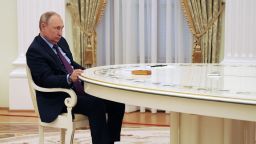Editor’s Note: Aaron David Miller is a senior fellow at the Carnegie Endowment for International Peace and author of “The End of Greatness: Why America Can’t Have (and Doesn’t Want) Another Great President.” Miller was a Middle East negotiator in Democratic and Republican administrations. The opinions expressed in this commentary are those of the author; view more opinion articles on CNN.
Three key US allies in the Middle East joined the United Nations General Assembly resolution condemning Russia’s invasion of Ukraine this week, but their votes belied the tension that lies beneath the surface.
While the United Arab Emirates voted in favor of the UNGA resolution, it abstained on the earlier UN Security Council resolution condemning Russia. Its UNSC decision was likely due to its frustrations with the Biden administration’s refusal to classify the Houthis as a foreign terrorist entity in the region, and its desire to stay in the good graces of Russia, which has become an ally in recent years.
The Saudis voted for the resolution, but they are intent on not alienating Moscow and have resisted Biden administration pressure to pump more oil, primarily because of an OPEC+ agreement they reached with Russia to limit daily production. Crown Prince Mohammed bin Salman is also reportedly angry at President Joe Biden for refusing to speak to him over his alleged involvement in the murder of the Saudi journalist Jamal Khashoggi. (The Saudi government still denies the Crown Prince played any role in the journalist’s death.)
Perhaps most complex is the case of Israel. One could be forgiven for thinking that as America’s closest ally and the region’s only democracy – however flawed – Israel’s unwavering support for the Ukrainians would be given.
But Israel’s unique interests in the region are forcing Jerusalem to navigate a course that tries to avoid alienating both Russian leader Vladimir Putin and Biden at the same time. As Putin’s bloody campaign in Ukraine intensifies, however, Israel may find itself under greater pressure to take a harsher anti-Russia stance.
Though Israel voted in favor of the UNGA resolution this week, it was preceded by a period of Israeli leaders’ awkward maneuvering to avoid a harsh personal condemnation of Putin’s invasion. On February 24, just after Russian troops stepped foot on Ukrainian soil, Foreign Minister Yair Lapid called the invasion “a serious violation of international order” – but he did not mention Putin’s name.
More recently, in response to a Russian attack on Kyiv that struck in the vicinity of the Holocaust memorial at Babyn Yar, Lapid “denounced the damage,” but failed to mention Russia was the perpetrator of the damage. Meanwhile, Prime Minister Naftali Bennett, reportedly seeking to play a mediating role in the crisis, has thus far avoided using the words “Putin,” “Russia” and “condemn” in the same sentence. While he has said, “We are praying for the welfare of Ukraine’s citizens and hope that additional bloodshed will be avoided,” Bennett has only agreed to send humanitarian aid – including medical equipment, water purifying systems, tents, blankets and sleeping bags – at this point.
Ukrainian Prime Minister Volodymyr Zelensky has asked the Israeli government to supply weapons too, but the Israelis have thus far demurred. On Thursday, the Ukrainian President, himself Jewish, urged Israel to take a stronger moral stand and offered some choice words for Bennett: “I don’t feel that he is wrapped in the flag of Ukraine.”
Israel’s hesitancy on Ukraine is driven, in part, by a need to maintain day-to-day cooperation with Russia in Syria. The Russians, who control much of Syrian air space, have given Israel wide latitude to strike Iranian, Syrian and Lebanese targets in Syria. The arrangement involves a deconfliction mechanism that prevents accidental conflict between Russian and Israeli forces through a real-time communication channel. Add to that Israel’s perennial concern about the well-being and security of the 150,000 Jews in Russia, and the argument in favor of maintaining good relations with Putin is a strong one.
At the same time, Israel has other critical interests to protect. As a state created as a safe haven for world Jewry in the wake of the Holocaust, Israel pays a price for appearing to waffle in the face of a predatory power preying on a weaker state.
According to Axios, the Biden administration has been understanding of Israel’s need for balance, but it has also pressed Israel “to take a clear stance” – arguing that this is a matter “of right and wrong.” And surely Israelis know this is the most serious international crisis of Biden’s presidency thus far.
Get our free weekly newsletter
Perhaps Bennett seriously believes that by refraining from attacking Putin head-on, he’ll maintain his putative role as an honest broker and mediator. But that wish will likely remain just that. While Bennett needs to protect Israel’s interests, he also has another role to play as one of America’s closest allies and as a democracy standing in the face of Russia’s aggression.
As Putin’s invasion claims more innocent lives, and the Ukraine crisis further threatens American, European and global interests, Bennett surely knows that Biden and many in the international community will expect Israel to act like it.








